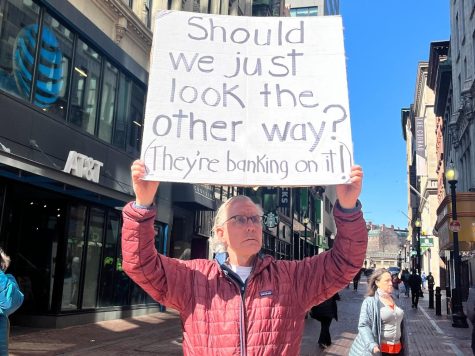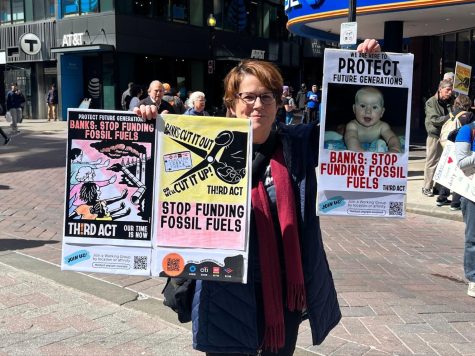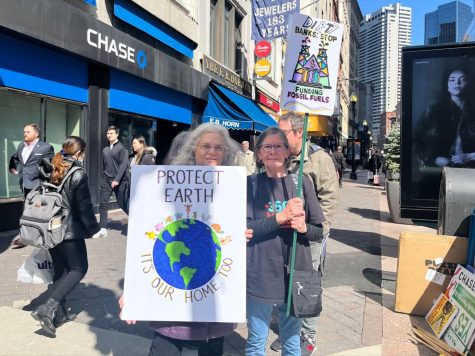More than 200 Boston residents, including many senior citizens, rallied on the streets of Downtown Crossing last Tuesday, ardently protesting Chase Bank, Citibank, Bank of America, and Wells Fargo—the four banks that make up the top fossil fuel funders in the world.
Protesters first gathered at the entrance of Chase Bank before marching to a nearby Bank of America Financial center. They united in waving banners and signs that read “Banks, cut it out or we cut it up!” and “Dirty Banks: stop funding fossil fuels!” Many members of the crowd cut up their own personal credit cards issued by the four banks, boycotting the financial institutions.
At the same time, over 100 other protests emerged across the nation in both major cities like San Francisco and Seattle, and smaller towns such as Bedford, Massachusetts, and Norwalk, Connecticut with one common goal: to demand the banks cease funding fossil fuel expansion. This includes Exxon Mobil, Gazprom, and Diamondback Energy, some of the banks’ top fossil fuel clients.
Third Act, a collective of Americans over the age of 60 engaged in environmental advocacy, organized and promoted the campaign nationwide. 350 Mass, a climate justice-oriented statewide association, collaborated with Third Act to bring the protests in Massachusetts to fruition.
Both organizations were founded by Bill McKibben, an American environmentalist, author, and journalist. In an interview with Democracy Now!, McKibben reiterated that the expansion of fossil fuel enterprises must stop, citing support from the Intergovernmental Panel on Climate Change and other climate scientists.
“All we want is for them to cease funding the expansion of [the oil and gas industries] the way that HSBC, the largest bank in Europe, agreed to do in December,” McKibben said in the interview.

Protester holding a sign.
In response to abolishment, the protestors in Boston expanded on ideas for environmental reform. Ellen Leaman, 73 years old and a member of 350 Mass, passionately urged the banks to research and invest in sustainable energy instead.¬Ý
‚ÄúStop funding fossil fuels, put your money elsewhere. Fund green energy,‚Äù Leaman said in an interview with the Beacon.¬Ý
These ideas are mirrored in Third Act’s campaign. Its mission statement claims that this funding is not necessary for the environment, but banks continue to do so for financial gain.
“Solar and wind power is now the cheapest way to generate power on our planet,” the collective’s website states. “So why do big banks keep loaning money to the fossil fuel industry? Because they can still make a quick profit—but only at the expense of everyone who comes after us.”
Many protesters demonstrated an urgency to mobilize because they were alarmed by recent news from the United Nations that the Earth is reaching a climate tipping point that threatens irreversible damage, they said.¬Ý
In November 2021, the United Nations Environment Programme declared the world’s climate emergency as “a code red for humanity.” The report claimed that the Earth is at imminent risk of exceeding 1.5 degrees Celsius—a threshold of temperature increase that world leaders agreed on in the Paris Agreement—due to high concentrations of greenhouse gas emissions in the atmosphere.
These conditions have only worsened since then. The U.N. released the AR6 Synthesis Report last Monday, detailing potential catastrophic climate disasters that could occur within the next decade. Terrestrial, freshwater, cryospheric, coastal, and open ecosystems are all at threat of increasingly irreversible losses, including species extinction and loss of biodiversity.
The report also issued a definitive warning declaring that the world is facing its final chance to combat these looming consequences of global warming. The U.N. and many other climate experts have asserted that there are seven years left until the climate crisis tips to a point of no return in the following decade. However, experts have a firm belief there is still time.
‚ÄúDeep, rapid, and sustained reductions in greenhouse gas emissions would lead to a discernible slowdown in global warming within around two decades, and also to discernible changes in atmospheric composition within a few years,‚Äù the report said.¬Ý
Last week‚Äôs protesters in Boston aimed to be catalysts in immediate climate action, targeting the country‚Äôs largest funders of greenhouse gas emissions, as noted in their chants.¬Ý
According to a 2022 fossil fuel finance report conducted by a group of seven environmental organizations throughout the country, such as Rainforest Action Network and SierraClub, six U.S. banks account for 31 percent of fossil fuel financing since 2016. Additionally, since the 2015 adoption of the Paris Agreement, the world‚Äôs 60 largest private sector banks financed $4.6 trillion USD into fossil fuels.¬Ý
The Paris Agreement, an international treaty adopted in 2015 for climate change mitigation, created a global framework that sought to limit global warming well under 2 degrees Celsius, maintaining temperature increases just below 1.5 degrees Celsius.
All four banks are members of the Net-Zero Banking Alliance, an industry-led and U.N.-convened global group of banks that are committed to achieving net-zero greenhouse gas emissions by 2050. JPMorgan Chase, in particular, promised to finance over $2.5 trillion this decade to aid long-term solutions that address climate change and sustainable development.
Protesters were not satisfied with these pledges, insisting that it was still crucial for banks to stop funding fossil fuel clients. Adding on, they also acknowledged possible environmental ramifications of The Willow Project, an oil drilling project by ConocoPhillips, Alaska’s largest crude oil producer. The Biden administration approved the project earlier this month.
Participants of Third Act and 350 Mass took the initiative to protest, recognizing that a majority of the world‚Äôs wealth is possessed by older generations‚ÄîBaby Boomers and the Silent Generation. In 2021, around 78 percent of the country‚Äôs wealth was reported to belong to older generations, with Baby Boomers owning 52.2 percent.¬Ý
Mary McCabe, 61 years old and a member of Third Act, acknowledged that older generations may have more influence than youth in this campaign due to more free time after retirement and higher financial assets from holding less debt and home ownership.
‚ÄúWe have the ability to move our money and it’s the biggest way that we can impact things, by cutting off the source of the funding for these banks,‚Äù McCabe said. ‚ÄúWe care about future generations and we don‚Äôt want this to be the legacy that we are leaving.‚Äù

Mary McCabe holds a Third Act protest sign and a homemade sign that features a baby picture of her son.
Leaman demonstrated concern for the well-being of future generations—especially her own descendants—when protesting against financing the fossil fuel industry.
‚ÄúI have grandchildren and children that are going to inherit a world that‚Äôs going to be different than this,‚Äù Leaman said. ‚ÄúI feel like it‚Äôs my duty to protest and work as much as I can in informing people about what‚Äôs going on.‚Äù¬Ý
Joy Gurrie, 73, joined the movement with her 15-year-old granddaughter in mind, considering what the future could look like for her.
“My granddaughter loves to ski and she loves dolphins,” Gurrie said in an interview with the Beacon. “I want there to still be mountains to ski on and oceans for dolphins to swim in.”

Ellen Leaman (left) and Joy Gurrie (right) hold up signs advocating for environmental awareness and defunding of fossil fuel companies.